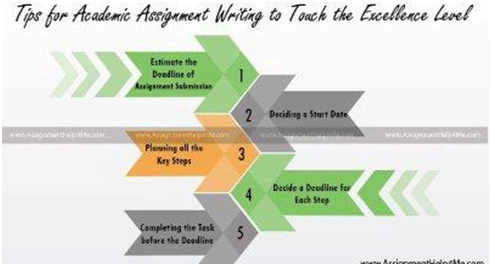When you are pursuing your higher studies at University or colleges your lecturers ask you to make an assignment which will demonstrate that you have learned all the core material. It involves a lot of writing like reports, essays or other types of assignments. The type of writing intended in assignments at schools differs widely from those of University. You need to follow a writing pattern and a significant structure to complete your assignments. The assignments must be presented with an argument and should be supported by adequate facts and evidence. Moreover, the assignment reflects the genuine efforts of the candidate.
When the lecturer asks you to make your first academic assignment at University you might feel hesitant. The most important thing to remember for producing a successful assignment is to know what is being actually asked for the given task. You need to give yourself enough time for planning, research work, writing, and revision so that you won’t have to rush to complete your assignment.
In this article, we will provide you with 10 quick tips to draft a successful assignment
- Planning – Planning your assignment helps you in preparing top-quality assignments. You need to draw a timeline to check how much time will be significant for each of the tasks. Allot enough time for finding information and research. Planning will help you to keep you and your assignments on track. Plan your timeline accordingly to develop your first writing draft, redrafting and for preparation of the final version. Assign enough time for the last task that will be for editing and proofreading purpose. Planning your assignment will help you to save considerable time.
- Collect information – Before you proceed writing, you need to gather enough information for the topic. You need to find reliable and relevant information by going through your course material or lecture notes. You can also visit your University library for better references. Talk to your tutorial or some experts who would also help you in your assignment. Also, make sure that you find the key concepts, databases, principles, theories, ideas and innovative arguments that would relate to your topic. Collect information from journal articles because it will provide you with the latest information.
- Analyse the collected information – After collecting information from various sources, start reading the information one by one. Try to understand the background and mark the selective information that you will need for the assignment. Try to understand regarding what is being asked by you in your assignment topic and what information you have collected for your assignment.
- Draft your assignment structure – Start making notes of the collected information. Draft an outline once you start finding the key ideas and concepts because it will provide you with a structure that you need to follow while writing your assignment. It will also help you to understand what you should include, what will be the structure of the topic and which sections to focus.
- Carefully interpret the questions – Try to analyze and interpret the complex questions. Read the questions carefully and then analyze them in-depth. Assess all the relevant issues and identify the strength, weakness, causes, effects, impacts, and implications. Evaluate the questions critically by treating them in an analytical way. Analyze all the issues with a comparing or contrasting approach and then evaluate Use proper illustrations or examples to clarify and define the issues.
- Start writing with an introduction – You shouldn’t start writing without introducing your topic. The introduction is the key aspect which should include a brief context, key argument, key issues and the goal statement of the assignment. Also, explain how you plan to answer all your questions. State a thesis statement or a clear argument which will indicate the scope of your discussions.
- Discussion – As you proceed to write the body of your academic assignment, construct a cohesive discussion. Present all your arguments with some supporting evidence. Explain all your arguments in a series of paragraphs stating the focus of the argument. Use quotes, statistics or facts in support of the argument or even as something to argue against. Try to interlink all your ideas so that the reader can connect with the ideas intended by you.
- Conclusion – The conclusion is the final chance where you can summarise your assignment. The conclusion leaves a lasting impression on the reader. You should draw an unambiguous conclusion from the key points and arguments that you have discussed in your assignment. Try to convey a final message in the conclusion by evaluating the overall discussion. Your conclusion should not contain long paragraphs. Also, make sure that you do not start introducing any new ideas in the conclusion because it is purely for summarizing all the arguments mentioned in the discussion section.
- Edit and Proofread – Once you complete the writing part, you need to carry a careful surgery of the assignment. It includes the checking of all the grammatical errors and spelling mistakes and removal of all the unnecessary information. Make sure that you have answered all your questions in the proper structure. Also, check that each section has been explained well in a smooth manner. Make sure that your assignment has been well-presented without any mistakes.
- References – References and bibliography play a significant role in your assignment. You need to acknowledge the source of ideas and information in the assignment. At the end of the assignment arrange all the references in an alphabetical order. Consequently, check all the guidelines provided to you before submitting the assignment.
As we all know that we cannot craft a well-written assignment overnight or on a single day. Only proper planning and pre-writing stages can help in its accomplishment. Moreover, you need to plan and implement all your ideas on pen and paper as early as possible so that you won’t have to rush to meet the deadline. I am sure that the tips provided above will definitely help you in completing your assignment in a successful manner.
Author Bio:- Aditya Singhal is the co-founder of Transtutors, a leading Online Education platform for college students. Having graduated from prestigious Indian Institute of Technology (IIT) – Delhi, Aditya has a personal interest in helping students.








